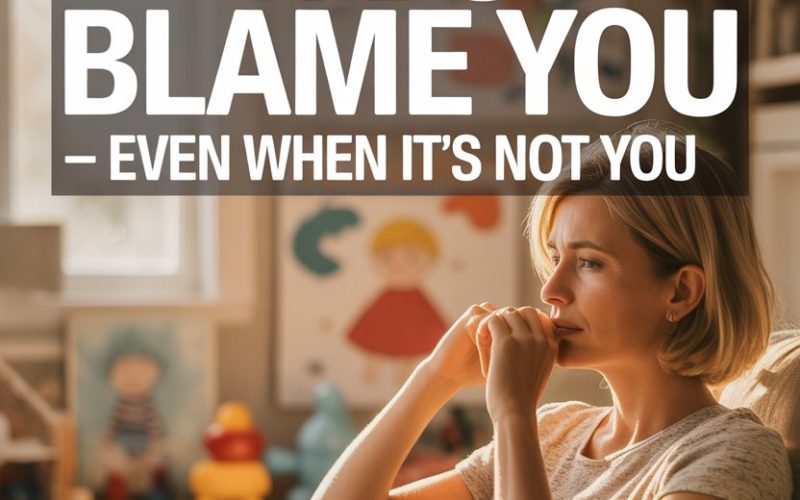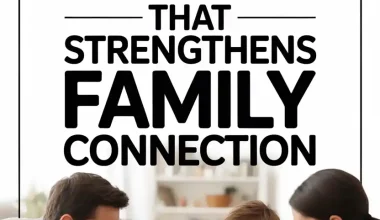If you’ve ever been accused of causing a sibling’s missing sock, the rain ruining sports day, or the tragic lack of cheese in someone’s sandwich, you’re not alone.
Somehow, as a parent, you become the designated scapegoat for every minor (and major) injustice in your children’s universe—even the ones you had nothing to do with.
Why do kids do this? And, more importantly, is there any way to survive it with your sanity intact?
Let’s get to the bottom of this messy little mystery.
Why You Become The Blame Magnet
There’s a reason you’re in the firing line when the world feels unfair from a kid’s point of view. You are, whether you like it or not, the safest target in the house.
Kids instinctively know you’re not going to pack up your suitcase and leave because they moaned about the broccoli or accused you of making the internet “slow.”
In the child’s mind, that’s a privilege—one that’s exploited with ruthless efficiency.
Psychologists call this “safe base” behaviour (source). You’re the person they can test boundaries with because your love doesn’t evaporate when tempers flare.
Blaming you for the rain? That’s actually a weird little sign they trust you’ll stick around.
As comforting as that is, it doesn’t make it any less aggravating when you’re accused of tampering with the weather.
The Brain Isn’t Built For Big Feelings
Children’s brains are tremendous at imagining monsters under beds, and absolutely dreadful at emotional self-regulation.
There’s a reason every minor tragedy feels apocalyptic: the prefrontal cortex (the bit in charge of logic and impulse control) is under construction until their mid-twenties (source).
When something goes wrong, their brains leap to the nearest, safest explanation—often, that’s you.
It’s not that they’re plotting your emotional demise. They simply can’t always separate the world’s randomness from their own sense of injustice.
“The toast burned—it’s Mum’s fault.” Logic has left the building. All that’s left is the urge to assign blame and be comforted.
Blame Is a Shortcut to Comfort
Odd as it sounds, children use blame as an emotional release valve. “If I can say it’s Dad’s fault, then I don’t have to sit with this horrible feeling that sometimes things just go wrong for no reason.”
Unfairness is easier to swallow when there’s someone to yell at, even if all you did was exist in proximity to the kitchen when someone’s biscuit broke.
Peaceful Parent Institute explains that children lash out at those who love them most because that’s when they feel safest to be vulnerable, angry, or upset.
While it feels like you’re personally being attacked, it’s actually a cry for help managing big, uncomfortable feelings.
The “You’re The Boss” Problem
From a toddler’s perspective, you are all-powerful. You control the bedtime, the snack supply, the television, and the WiFi password.
If something bad happens, you must have willed it into being. You’re the wizard behind the curtain of family life—at least in theory.
This perception sets you up for blame, even for things no parent can actually control. (No, you did not cause the ice-cream van to take Bank Holidays off.)
Blame as a Communication Shortcut
Kids are notorious for cutting corners when they’re emotional or tired. Instead of saying, “I’m disappointed I didn’t get chosen for the team,” it’s easier to shout, “You made me late and that’s why they didn’t pick me!”
Assigning blame is a shortcut to expressing frustration or sadness, especially for children who haven’t quite mastered talking about their feelings.
You can almost hear the translation: “I’m hurting. Fix it, please.” Trouble is, we rarely receive it that way.
Sibling Rivalry and Parental Blame
Ever been caught in the crossfire of a sibling battle, only to be named as the villain who “always takes their side”? Welcome to the strange logic of sibling rivalry.
When children feel a sense of injustice between siblings, the parent becomes the judge, jury, and—if things get heated—scapegoat.
Research into sibling dynamics shows that parental involvement is often interpreted as “picking a side.” Suddenly, you’re not just Mum or Dad, you’re the architect of all perceived unfairness.
Social Media and The “It’s Your Fault” Ripple
Thanks to group chats and TikTok, blame can quickly escalate from minor to melodramatic. A single moody emoji about screen time can become “My parents never let me do anything.”
The echo chamber of social media makes it easy for children and teens to feel like they’re uniquely oppressed by your rules, even if you’ve barely lifted a finger.
This isn’t just anecdotal—studies suggest digital peer groups intensify feelings about parental “unfairness.” You’re no longer just contending with your own child’s blame game, but the silent Greek chorus of their mates.
When Blame Becomes a Habit
Here’s the kicker: blaming you can become a reflex if it’s never challenged.
If children discover that unloading on you brings immediate attention or softens the rules, they’ll do it more often. Who wouldn’t?
It’s less about malice, more about what works. If blaming you for the lost library book means you hunt for it, the system is working…for them, at least.
Practical Ways to Tackle the Blame Game
You didn’t sign up to be the family’s emotional sponge.
The good news? There are simple, actionable steps you can take to shift this dynamic—without adopting the emotional resilience of a brick wall.
Name the Feeling, Not the Fault
Instead of reacting to the accusation (“You never washed my PE kit!”), try reflecting the feeling: “Sounds like you’re really frustrated about your kit.”
This approach, recommended by child psychologists, steers the conversation away from blame and toward the real issue—usually disappointment or anxiety.
You’re not letting them off the hook; you’re simply redirecting their attention to what’s actually going on inside.
Model How to Own Mistakes
Strange as it sounds, admitting your own small errors (“Oops, I did forget to buy bananas—sorry!”) helps children learn that everyone messes up and it’s okay.
Owning your mistakes, without drama, sets the tone for how you’d like them to behave.
Bonus: it’s a powerful antidote to perfectionism, which is often lurking behind the blame habit.
Swap Blame for Problem-Solving
When the finger-pointing starts, shift into solution mode: “We’re missing a sock. What’s our plan?” Helping children find the next step (rather than marinating in ‘who’s at fault’) builds resilience and a sense of agency.
Keep it light. If you approach this with a sense of humour, even an ombre pile of odd socks feels less catastrophic.
Use Humour As Your Shield
A well-timed joke can break the cycle of blame faster than a TED Talk on personal responsibility. “Apparently, I’m in charge of the weather now.
Should I make it sunny for your school trip, or are we all in favour of snow?” Keeps everyone’s dignity intact—and usually earns a reluctant smile.
Set Boundaries on Rudeness
Empathy is great, but nobody expects you to be a doormat.
If blame tips into rudeness or disrespect, draw the line calmly and firmly: “I get you’re upset, but we don’t speak like that in this house.” Consistency here gives your child both security and clear limits.
Teach “I Feel” Statements
Blame is often a shortcut for “I feel sad/angry/disappointed.” Gently coach your child to swap “You always…” with “I feel…” It takes practice, but it’s gold for family communication.
Try it yourself, even when you want to say, “You never pick up your towel.” A little humility goes a long way.
Don’t Take It (Too) Personally
It’s not really about you, as much as it stings. Remind yourself: you’re the safe harbour where they offload the emotional cargo they can’t manage alone.
You’re not a doormat—you’re a lighthouse in a storm.
Easy to say, harder to do. Stepping back, even for a minute, helps you respond with calm rather than defensiveness.
Spot When It’s Gone Too Far
Most of the time, this blame game is normal, if annoying.
But if your child seems stuck in a pattern of excessive blame, or if it tips into anxiety, low self-esteem, or aggression, consider reaching out to a professional for extra support.
You don’t have to weather this solo.
Why It’s (Weirdly) a Compliment
If you’re still reading this with a faint sense of injustice, here’s one last nugget: being blamed means you’re the safest person in their world.
Kids don’t usually offload like this with those they don’t trust.
That doesn’t mean you should grin through every accusation, but maybe cut yourself some slack the next time you’re accused of being the reason the WiFi is slow.
At the end of the day, you can’t—and shouldn’t—shield your child from every frustration or disappointment.
What you can do is help them learn to process those feelings, own their part, and (eventually) swap blame for honesty. Not this week, maybe, but someday.
Until then, wear your “official family scapegoat” badge with pride. You’ve earned it.




